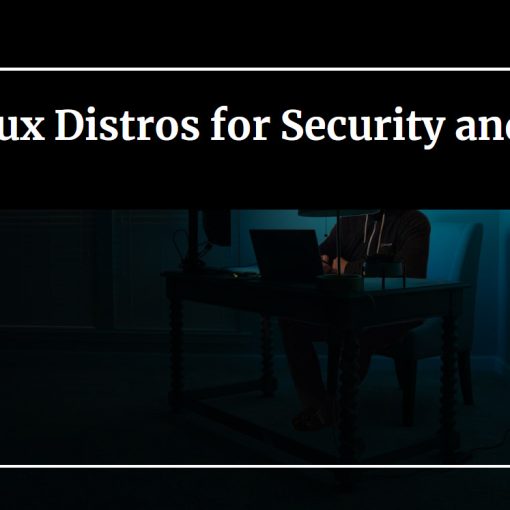In the coming Micropocalypse, millions of perfectly good 3-5-year-old Microsoft Windows computers may dump because their hardware can’t be upgraded to Windows 11. It’s no surprise that people are starting to look for other options, like Linux.
Recommended articles:
- Linux vs. Windows: A Casual, Realistic Perspective
- Opinions or Options: An Honest View of Windows versus Linux
- Best Linux Distros for Windows Users
Whether you know it or not, you use Linux every day. Linux powers appliances, smartphones, gadgets, and almost everything else. That includes the world wide web, the world’s top supercomputers, and stock exchanges. Linux is becoming a popular choice for personal computers because it’s a secure and worry-free operating system.
But if you don’t use anti-malware and a VPN with threat detection capabilities, Linux is not virus-proof. You can still become a victim of malicious code – and if you do any kind of desktop sharing, you’d better protect your computer’s access points against hacking!
Let’s look at some common Linux security myths and see what you can do to secure this amazing, free operating system.
The Top 5 Linux Security Myths
Think about this fact: millions of users are already using or preparing to switch to Linux because soon, their computers won’t be able to cope with Windows, and they cannot afford to upgrade their hardware. Linux is not just their only choice but also their best choice for the following reasons:
Myth 1: Linux Is Difficult To Use
Nope, that hasn’t been true in years. Linux was originally designed for people with some computer or programming expertise, but nowadays, Linux looks almost identical to Windows, and it is just as easy to use.
In some ways, Linux is a bit easier to use because it seldom crashes or gets infected by malware.
Myth 2: Linux Has Too Few Application Programs
You can use your Linux to attend online classes, speak to friends or family, surf the web, listen to music, watch movies, write documents, do household accounting, and play games.
There are thousands of Linux application programs as good as, or better than, Microsoft or other commercial software. And, as a bonus: the vast majority of them are free.
Myth 3: There Are Too Many Different Linux Versions
Yes, there are many Linux distributions (versions), but they all use the same basic kernels, commands, and programs. The direct opposite is true of Microsoft Windows.
The various Microsoft Windows operating systems (like Windows 95, 7, ME, NT, CE, 2000, XP, 10, and 11) are not alike. They resemble each other only superficially. On top of that, each one gets fragmented even further when Microsoft rolls out a new service pack or major patch to fix bugs and security holes.
Myth 4: Linux Is Obsolete Because It’s Old
Linux is based on UNIX, developed in 1969, but has survived more than 30 years of testing. It is still being tweaked and improved by the best computer scientists worldwide. As you know, Windows 7, 8, 10, and all the rest only ‘live’ for a few years before a new system entirely replaces them.
This is due to either technical problems or planned obsolescence to protect income streams.
Myth 5: Linux Is 100% Secure
Linux is far more resistant to malicious code than Microsoft Windows because the source code is freely available. Experts worldwide can inspect and test it to find security flaws and write patches as fast as possible. Yet, the threat landscape keeps evolving, and you must stay ahead.
You can take two steps to make your Linux more secure: use antivirus and use a VPN.
How Can I Protect My Linux Computer? The Top 3 Facts About Linux Security
Fact 1: You Need A Malware Scanner For Your Linux Computer
Use software that’s specially designed to find malicious software. Some malware software (like ClamAV) is free and generally regarded as the best open-source malware scanner for Linux. You should use it together with real-time antivirus software or a VPN with real-time anti-malware protection.
Fact 2: You Need An Antivirus For Your Linux Computer
Use your anti-malware scanner in conjunction with a commercial anti-malware software application. There are a few options on the market, with much more development.
Fact 3: You Need A VPN With Real-Time Threat Protection For Your Linux Computer
Most people only use a VPN to download torrents without incurring the wrath of their ISP. That’s not good enough! Your VPN must not only encrypt every scrap of network traffic to and from your PC but should also protect you from malware and ransomware.
The best VPN will be able to provide active malware protection to stop bugs before they reach you. A next-generation VPN (like NordVPN) should be able to:
- Scan every file you download
- Be able to delete any malicious download
- Block malicious website URLs
- Identify and block links in phishing emails
Whichever VPN you choose, it must be compatible with OpenVPN and Linux. OpenVPN is an open-source VPN protocol that can be used with all your devices. It should be able to protect iOS, Linux, Android, Windows, and even your IoT gadgets via a network firewall.
The Takeaway – Start Choosing Cross-Platform Solutions
The coming Micropocalypse will affect vast numbers of Windows computers. The smartest move you can make right now is to choose a Linux distro and get a multi-platform, multifunction antivirus and VPN. You’ll be able to use it on both your up-to-date Windows computers and your other, possibly Linux devices.




3 thoughts on “Is Linux Really the Most Secure Operating System? Facts and Myths about Linux Security”
“Is Linux Really the Most Secure Operating System?”
No it is not, so do not pretend that it is.
GNU/Linux systems are far more secure than MS Windows but most experts claims that OpenBSD is the probably the most secure operating system available for the desktop and server.
Also your article does not explain that ClamAV which is very good but far from perfect, is a primarily a scanner for malware in Windows executable format.
Regardless of what system is used, the user is the biggest security risk.
Linux is more secure if you only use the official repositories, if you do not run as root, and if you do not click on unknown hyper links in messages.
Linux is not hard to use, I am a total GUI guy and I have been using Linux for 15 years.
My problem with Linux is that it is sold as a virus/malware free OS. I think that is a lie with any system and how do you know when most Linux users probably don’t use security software. In fact there are few vendors who even develop security software for Linux. Seems to me that I wouldn’t take someones word that uses Linux that its free from attacks. I do think Linux has to potential to be more secure by design, but certainly not impenetrable. Apple made similar claims about Mac OS for years until it became more popular and a attractive target.